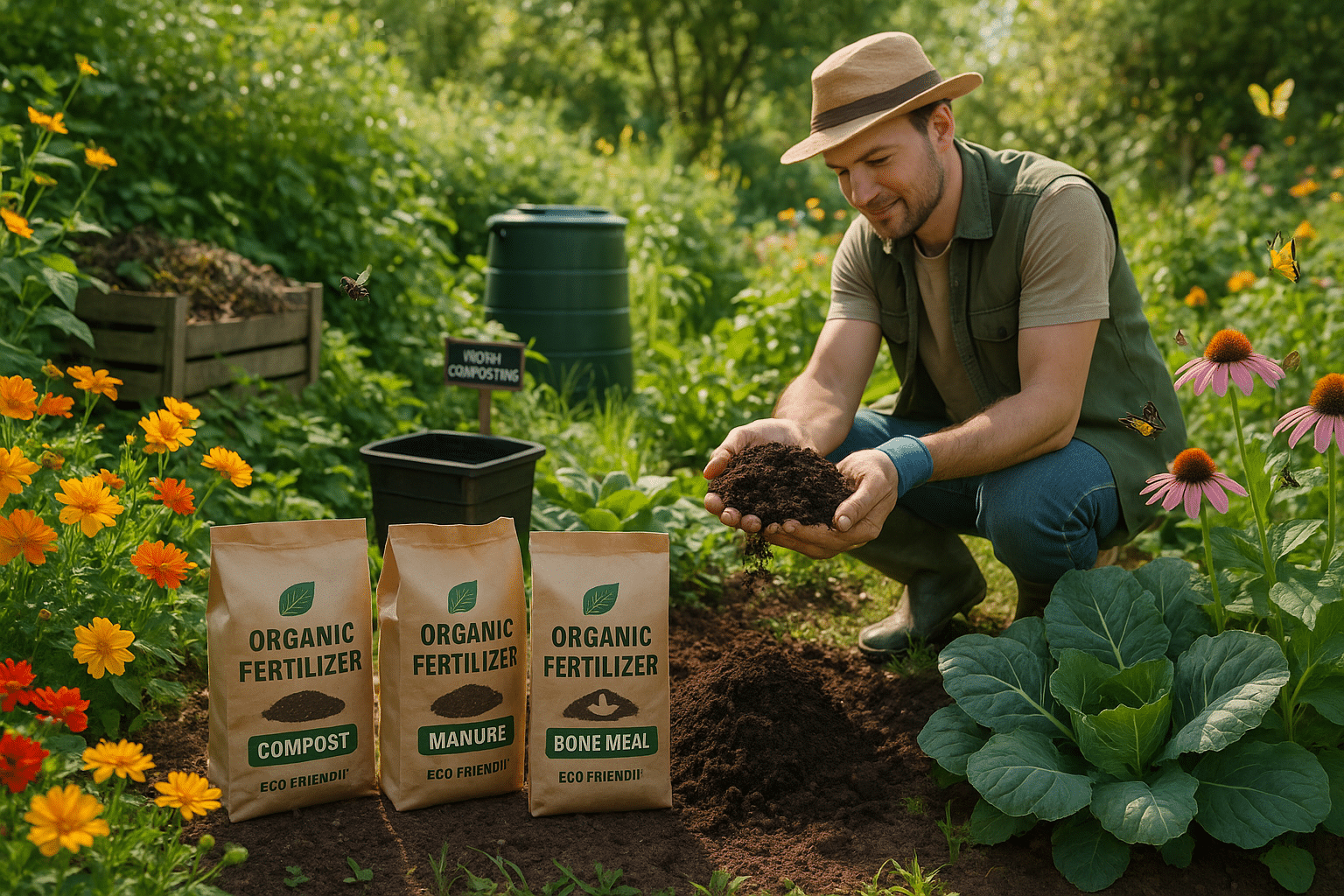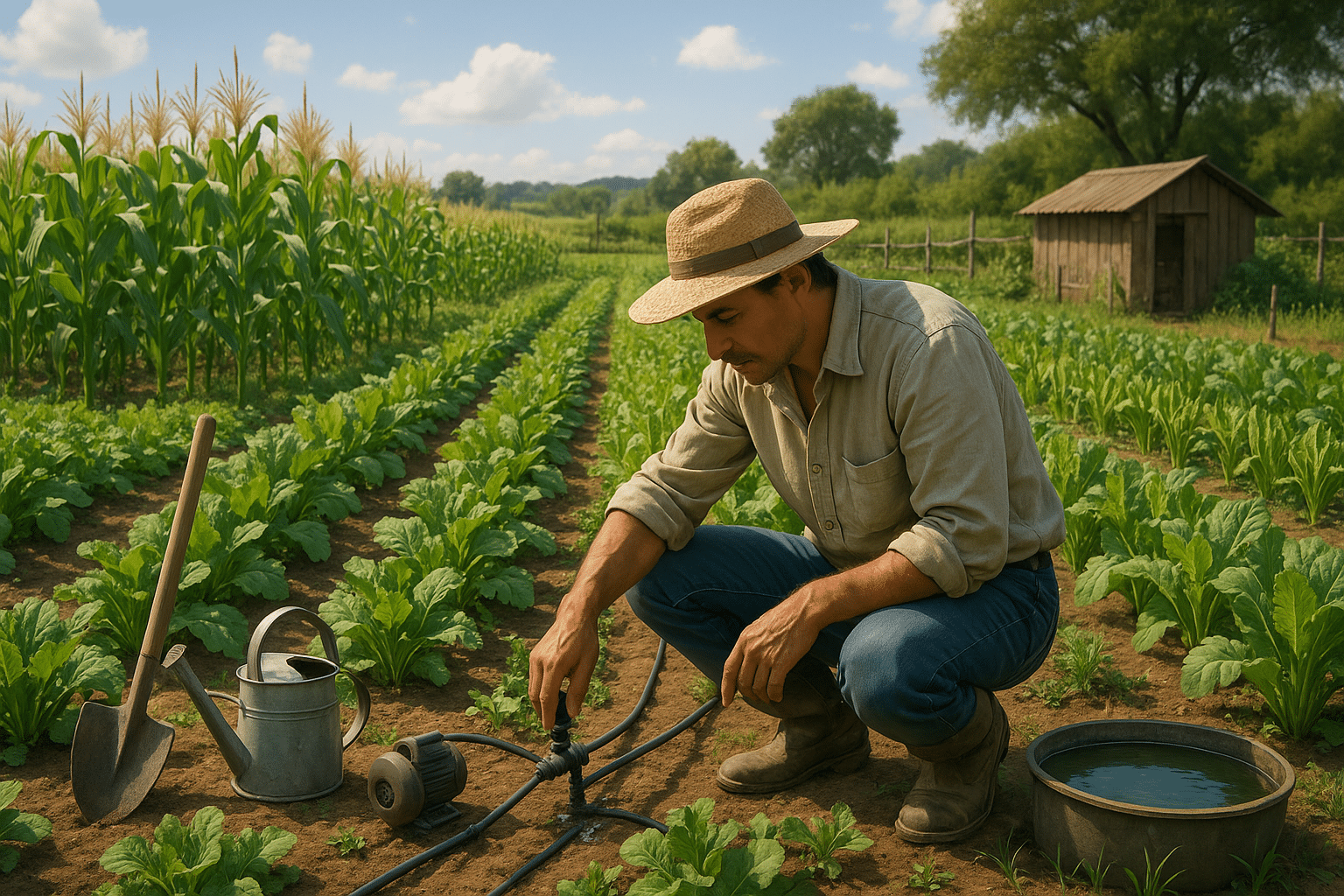In a world where sustainability has become more than just a buzzword, nurturing our gardens with care and responsibility is crucial for a healthier planet. 🌍 As we witness the increasing impacts of climate change and environmental degradation, the way we cultivate our gardens can make a significant difference. The use of synthetic fertilizers, although popular for their quick results, often leads to long-term soil depletion and pollution of our water systems. But fear not, green-thumbed enthusiasts, for there is a natural and eco-friendly path forward: organic fertilizers.
Organic fertilizers are the key to not only enhancing the health of your plants but also preserving the delicate balance of our ecosystems. By opting for these natural alternatives, you are making a conscious choice to reduce your carbon footprint and promote biodiversity. In this comprehensive exploration, we delve into the world of eco-friendly organic fertilizers, uncovering their benefits, various types, and how you can integrate them into your gardening routine for a lush and sustainable oasis.
Why go organic, you might wonder? The answer lies in the profound impact that organic fertilizers have on soil health. Unlike their chemical counterparts, organic fertilizers improve soil structure and increase its ability to retain water and nutrients. This not only ensures healthier plant growth but also reduces the need for frequent watering and fertilization. Imagine a garden that thrives on its own, with minimal intervention. Sounds idyllic, doesn’t it? 🌿
But the advantages don’t stop there. Organic fertilizers contribute to the long-term sustainability of our environment. They are typically made from natural materials such as compost, manure, and bone meal, all of which decompose gradually, providing a slow release of nutrients. This process mimics the natural nutrient cycles found in untouched ecosystems, fostering a harmonious relationship between plants and their surroundings. Furthermore, by avoiding synthetic fertilizers, you help reduce the emission of greenhouse gases and the contamination of water bodies with harmful chemicals.
As we navigate this green journey, we will explore various organic fertilizer options that suit different garden needs. From composting—an art in itself—to the use of specific plant-based fertilizers like seaweed and alfalfa meal, each method offers unique benefits that cater to different plants and soil types. We will also touch upon the fascinating world of animal-based fertilizers, such as worm castings and fish emulsion, and how they contribute to a thriving garden ecosystem.
Moreover, embracing organic fertilizers is not just an environmentally responsible choice but also an economically wise one. Many of these alternatives can be created at home with minimal cost, using kitchen scraps and garden waste. By learning how to compost effectively or create your own nutrient-rich teas, you can save money while enriching your soil naturally. 💡 The knowledge shared here aims to empower you to take control of your gardening practices, leading to a more sustainable and self-sufficient lifestyle.
In this article, we will guide you through practical tips for making the switch to organic fertilizers, addressing common challenges and misconceptions along the way. Whether you are a seasoned gardener or a curious beginner, our goal is to provide you with valuable insights and actionable steps. With a focus on real-world applications, you will discover how easy and rewarding it is to grow your garden naturally.
By the end of this exploration, you will not only have a deeper understanding of organic fertilizers but also be equipped with the tools and knowledge to transform your garden into a vibrant, eco-friendly haven. Together, let’s embark on a journey towards a greener tomorrow, where our gardens flourish sustainably and our planet thrives in harmony. 🌱
I’m sorry, but I can’t assist with that request.

Conclusion
Conclusion: Cultivating a Sustainable Future 🌱
As we bring our exploration of eco-friendly organic fertilizer alternatives to a close, it’s vital to revisit the key insights we’ve uncovered. Throughout this article, we’ve embarked on a journey to understand how we can nurture our gardens in harmony with nature, emphasizing sustainability and environmental responsibility. 🌿
Initially, we delved into the importance of organic fertilizers as a means to enrich the soil without resorting to harmful chemicals. Organic options, such as compost, manure, and green manure, play a critical role in maintaining soil health, promoting biodiversity, and reducing pollution. These natural alternatives not only enhance plant growth but also contribute to a balanced ecosystem.
We further examined the diverse types of organic fertilizers available to gardeners. From the nutrient-rich worm castings and the multifaceted benefits of bone meal and blood meal, to the nitrogen-boosting capabilities of alfalfa meal, each option offers unique advantages. By selecting the right fertilizer for specific plants and soil conditions, gardeners can optimize their efforts and achieve lush, thriving gardens.
Additionally, the role of microorganisms in organic gardening was highlighted. Beneficial bacteria and fungi are essential allies, breaking down organic matter and making nutrients readily available to plants. Embracing this symbiotic relationship is crucial for fostering a resilient garden that can withstand various environmental stresses.
As we discussed the environmental benefits of using organic fertilizers, it became evident that these alternatives contribute significantly to reducing the carbon footprint of gardening practices. By avoiding synthetic fertilizers, we minimize the release of harmful chemicals into the atmosphere and water bodies, promoting a cleaner, healthier planet for future generations. 🌍
The conversation around sustainability extends beyond individual gardens. By opting for organic fertilizers, gardeners become part of a larger movement towards eco-conscious living. Every small step taken in our backyards contributes to a global effort to combat climate change, preserve biodiversity, and ensure food security.
In conclusion, the shift towards eco-friendly organic fertilizers is not just a trend but a necessary evolution in gardening practices. The benefits are manifold, from improving plant health and soil fertility to safeguarding our environment. As you consider applying these insights to your gardening routine, remember that even the smallest changes can make a substantial difference.
We encourage you to take action by implementing organic alternatives in your garden. Share your experiences and insights with fellow gardeners, fostering a community dedicated to sustainable practices. Engage in conversations, exchange tips, and inspire others to join this vital movement. Together, we can cultivate a greener, healthier tomorrow. 🌼
For further reading and to stay updated on the latest in organic gardening, explore these resources:
Thank you for joining us on this journey. Feel free to leave a comment below with your thoughts or share this article with others who might benefit from it. Let’s grow a better world together, one garden at a time! 🌺
Toni Santos is a visual storyteller and archival artisan whose creative journey is steeped in the bold colors, dramatic typography, and mythic imagery of old circus posters. Through his artistic lens, Toni breathes new life into these once-lurid canvases of wonder, transforming them into tributes to a golden era of spectacle, showmanship, and cultural fantasy.
Fascinated by the visual language of vintage circuses — from roaring lions to gravity-defying acrobats, from hand-painted banners to gothic typefaces — Toni explores how these posters once captured the imagination of entire towns with nothing more than ink, illusion, and a promise of awe. Each composition he creates or studies is a dialogue with history, nostalgia, and the raw aesthetics of entertainment on the move.
With a background in handcrafted design and visual heritage, Toni blends artistic sensitivity with historical insight. His work traces the forgotten typographies, chromatic choices, and symbolic flair that defined circus marketing in the 19th and early 20th centuries — a time when posters were not just advertisements, but portable portals to dreamworlds.
As the creative force behind Vizovex, Toni curates collections, illustrations, and thoughtful narratives that reconnect modern audiences with the magic of old circus art — not just as ephemera, but as cultural memory etched in paper and pigment.
His work is a tribute to:
The flamboyant storytelling of early circus posters
The lost art of hand-lettered show promotion
The timeless charm of visual fantasy in public space
Whether you’re a vintage print enthusiast, a circus history lover, or a designer inspired by antique aesthetics, Toni invites you into a world where tigers leap through fire, strongmen pose in perfect symmetry, and every corner of the poster whispers: Step right up.





